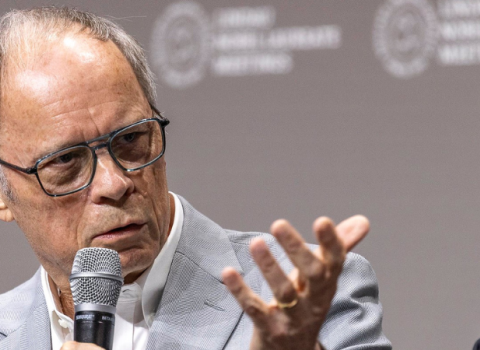Discussing further collaboration with Ethiopian universities, visiting local projects that involve KU Leuven researchers, and reconnecting with KU Leuven alumni: Rector Luc Sels and Vice Rector Chris Van Geet have a busy week ahead in Africa.
Ethiopia is a key partner of KU Leuven on the African continent, says Rector Luc Sels. “With this visit, we want to reinforce existing partnerships and pave the way for further collaboration. We’ll be travelling from Mekelle to Arba Minch and Addis Ababa and, along the way, we’ll visit various projects that involve KU Leuven researchers.”
Collaborating with Ethiopia
KU Leuven has been cooperating with Ethiopian institutions since 1998, says Vice Rector Chris Van Geet, who is responsible for university development cooperation at KU Leuven. “Among other things, KU Leuven has already coordinated two important Institutional University Cooperation (IUC) programmes, with Mekelle University – our first partner in Ethiopia – and with Arba Minch.”
Existing cooperation efforts between KU Leuven and its Ethiopian partners are often funded by VLIR-UOS. The projects are typically multidisciplinary, involve different Flemish universities, and focus on capacity building, institutional support, and mobility of staff and students.
“Our collaboration with Ethiopia also involves a remarkable range of disciplines,” Van Geet continues. “Almost every Faculty at KU Leuven has a link with Ethiopia. Popular themes for collaboration include biodiversity, sustainable farming, and water quality management, but we also have social scientists specialising in gender and public administration in Ethiopia, architects working on urban planning, and biomedical scientists supervising Ethiopian PhD students.”
MOUs: the real deal
During this visit, Rector Sels and Vice Rector Van Geet want to take collaboration between KU Leuven and its Ethiopian partners to the next level. Therefore, KU Leuven will sign memoranda of understanding (MOUs) with the universities of Addis Ababa, Arba Minch, and Mekelle. In these written statements, the institutions involved express their intention to promote collaboration.
But what is the added value of MOUs when institutions are already working together? “An MOU is a formal agreement, but it’s more than a formality,” Rector Sels explains. “For one thing, MOUs don’t come with a budget, but they can help secure European or other project funding. After all, an MOU is written proof that two institutions are truly committed to working together. That is just one of the ways in which MOUs can open up new avenues for collaboration. Another example would be the facilitation of staff and student mobility.”
KU Leuven ambassadors in Ethiopia
More than 330 students of Ethiopian nationality have already obtained a degree from KU Leuven, many of them with VLIR-UOS scholarships. Ethiopian master’s and doctoral students are particularly drawn to the Faculties of Bioscience Engineering, Engineering Science, Engineering Technology, and Science.
In March 2018, Ethiopia became the first African country with its very own KU Leuven Alumni Chapter. Vice Rector Van Geet: “This Alumni Chapter creates opportunities for our Ethiopian ambassadors to connect, and it constitutes a direct link with KU Leuven. We look forward to meeting local alumni during the get-togethers in Addis Ababa, Arba Minch, and Mekelle. It will also be a wonderful opportunity to present our new video about the fruitful collaboration between KU Leuven and its Ethiopian partners” (see above).
This communication was first published 20 August 2019 by KU Leuven.





 A unique international forum for public research organisations and companies to connect their external engagement with strategic interests around their R&D system.
A unique international forum for public research organisations and companies to connect their external engagement with strategic interests around their R&D system.